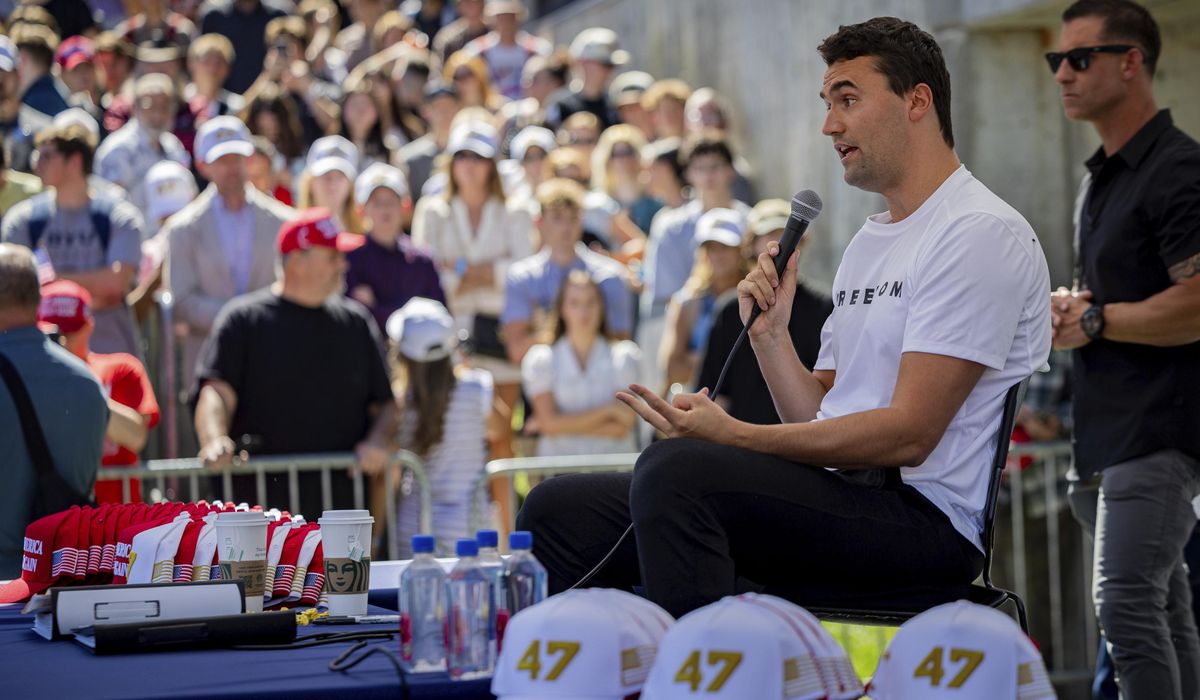


Conservative activist Charlie Kirk was assassinated by a gunman Wednesday while speaking on a college campus in Utah, leaving a devastated political world to renew calls to handle ideological disagreements with words, not violence.
Video of the attack showed a single shot that appears to have struck Mr. Kirk in the neck as he was answering questions from the gathering of mostly college students at Utah Valley University in Orem.
President Trump personally announced Mr. Kirk’s death to the world hours after the shooting, offering his sympathies to the family and calling the 31-year-old husband and father “great, and even legendary.”
“No one understood or had the Heart of the Youth in the United States of America better than Charlie. He was loved and admired by ALL, especially me, and now, he is no longer with us,” the president said.
Authorities initially said a suspect was in custody, but later recanted that. They said there was just one shot, which, from the video, was clearly aimed at Mr. Kirk.
Mr. Kirk, founder of Turning Point USA, was at the university as part of his American Comeback Tour, where he takes questions from the audience and debates the big political questions of the day.
SEE ALSO: Charlie Kirk, 31, was a conservative icon whose movement will grow stronger, allies say
Former Rep. Jason Chaffetz, who was at the event, said the shot rang out just as Mr. Kirk was talking about recent mass shootings where transgender individuals have been identified as the shooters.
Mr. Chaffetz doubted that it was a coincidence.
He called the shooting shocking in a community as safe as Orem.
“We don’t have murders, let alone shootings, let alone something of this magnitude,” he said.
Ahead of Mr. Kirk’s appearance at the school, an online petition circulated asking the school to block the event.
“Charlie Kirk is known for his divisive rhetoric that often supports policies and laws which aren’t inclusive and can marginalize various communities,” the petition said. It gained 944 supporters.
The school had defended hosting Mr. Kirk, saying it was committed to “free speech, intellectual inquiry and constructive dialogue.”
His slaying follows several assassination attempts on Mr. Trump’s life during last year’s presidential campaign, and it sparked new calls from conservative movement figures for the left to cool the rhetoric.
Major liberal movement leaders took up that call.
California Gov. Gavin Newsom called the attack on Mr. Kirk “disgusting, vile, and reprehensible.”
“In the United States of America, we must reject political violence in EVERY form,” Mr. Newsom said.
Former Vice President Kamala Harris, who was heavily criticized by Mr. Kirk during last year’s presidential election, said she was “deeply disturbed” by the shooting. She also said she and former second gentleman Doug Emhoff were praying for Mr. Kirk.
“Let me be clear: Political violence has no place in America. I condemn this act and we must all work together to ensure this doesn’t lead to more political violence,” she wrote on X.
Former Rep. Gabby Giffords, who was herself wounded in a shooting at an outdoor get-together with her Arizona constituents in 2011, said she was “horrified” by the new attack.
“Democratic societies will always have political disagreements, but we must never allow America to become a country that confronts those disagreements with violence,” said Ms. Giffords, who now leads a gun-control group.
Mr. Kirk had become a pivotal voice in conservatives’ outreach to younger voters. He would set up what he called his “prove me wrong table” and engage with all comers over whatever issues they wanted to discuss.
His next stop was supposed to be on Sept. 18 at Colorado State University, and then the University of Minnesota-Twin Cities on Sept. 22 and Virginia Tech in Blacksburg, Virginia, on Sept. 24.
Ahead of Wednesday’s event, Mr. Kirk had posted photos and video of the large crowd that had gathered to hear him in Orem. He was fist-bumping and engaging with the crowd.
• Kerry Picket contributed to this report.
• Stephen Dinan can be reached at sdinan@washingtontimes.com.
